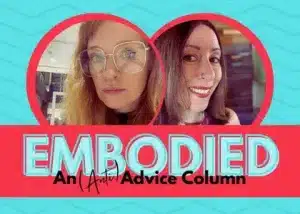On Friday afternoons I work at Bluestocking, a used bookstore in Hillcrest, a popular San Diego neighborhood and the center of the LGBT community. Next door is Breakfast Bitch, a relatively new and trendy brunch/lunch destination, people always massed around the entrance waiting for tables. Their schtick, which people seem to love, is that waitstaff call guests bitches, as in “Can I get you bitches something to drink?” Every birthday celebration, and there are many every day, is broadcast with a raucous rendering of the hip hop song “Birthday Bitch.” I hear it, again and again, blasting out their door and into ours—“One time for the birthday bitch, Two times for the birthday bitch, Three times for the birthday bitch…”—and two things happen. One, I start wondering about the reappropriation of the word “bitch.” Two, I bristle. I wince. I should be inured to it by now, but the reverse is true; it makes me increasingly uncomfortable.
From the Old English bicce, female dog, “bitch” is a term of contempt applied to women since the 15th century. Originally to suggest rampant sexuality, dogs in heat, it morphed into women behaving badly—according to men and more recently to other women as well. Synonyms include floozy, harlot, hussy, slut, tart, tramp, vamp, wench, whore, and more, including witch, hellion, and shrew. A bitch was aggressive and belligerent, controlling and out of control. Threatening. Off the leash.
When the second wave of the women’s movement came hurtling into the sixties, feminists began to reclaim the word, to make the designation a point of pride: a bitch was strong, independent, confident, assertive. Finally speaking up, sticking up for herself. Attorney and activist Jo Freeman published the Bitch Manifesto in 1968, saying that “A Bitch takes shit from no one. You may not like her, but you cannot ignore her.” Bitch magazine launched in 1996, calling itself a “feminist response to pop culture.” A Ms. magazine contributor in 2011 called on women to celebrate their bitchiness, and Gloria Steinem suggested in 2015 that “when somebody calls you a bitch, say thank you.” In a 2008 Saturday Night Live skit, Tina Fey observed that people were calling Hillary Clinton a bitch. “She is,” she said. “And so am I. Bitches get stuff done!”
I bought into the concept that women could be mean and merciless; we could be ruthless leaders like Golda Meir and Margaret Thatcher; we could stand our ground in any situation—we could be bitches. This was equality too. One of the few movie lines I ever memorized is from the adaptation of Stephen King’s Dolores Claiborne. “Sometimes being a bitch is all a woman has to hold on to” was uttered three times, by three different characters, all fending off the patriarchy, grasping at empowerment.
Over the course of the 20th century, the word’s usage has expanded, flipped sideways and upside down. It’s no surprise that a slur against women would be adopted by men—prisoners, gay men, macho hipsters—as an attack against weak or dependent men, sissies and softies. But in this context, the term ricochets. Rather than unmanageable women, bitches are women (and men) who do others’ bidding. In an episode of House of Cards, Remy, a Black lobbyist, and Jackie, a Congresswoman, are on opposing sides, but he reminds her that they’re both beholden to higher-ups, both someone’s bitch.
Atlantic magazine examined the trend in a 2015 article, “Meet the New Bitch: The curious evolution of a slur.” It noted that Ernest Hemingway applied the word to women, notably Gertrude Stein, who held her own against him, but also to bad editors and Spanish dictators, instances in which a badly behaving man has traditionally been called a son of a bitch. In the TV series Breaking Bad, the character Jesse Pinkman says “bitch” 54 times, sometimes as an insult or in anger, sometimes in camaraderie or as an expression of triumph. Sometimes he pronounces it in two syllables (“bi-atch”), and sometimes it serves as a meaningless filler, the way people use and abuse the word “like.” In hip-hop culture and music it’s been used to denigrate women who step out of line, while Beyonce, Rihanna, Nicki Minaj, and others have rebounded with “bad bitch” songs and memes to champion strong, independent woman, echoes of the 1968 Bitch Manifesto.
And yet. We’re told on many fronts that “bitch” is cool. That women can take pride in owning their inner bitch. But the meaning hasn’t really changed. The word is still used primarily to attack women who threaten the status quo, women in positions of power, as when Alexandria Ocasio-Cortez was called a “fucking bitch” by a white male colleague on the floor of the House of Representatives. It reeks of sexism, its hatred and misogyny undisguised. Women use it among themselves as an expression of support and sisterhood, but they still use it against each other too. Remember when Barbara Bush referred to Geraldine Ferraro as something that “rhymes with rich,” later insisting that she meant “witch.” I’ve been guilty of it myself. My daughter and I refer to a woman who wronged us, deeply and intentionally, as “the bitch.” Nothing else seems to adequately express our bitterness, but I cringe when I hear myself say it. I’d love to believe we can reappropriate language and wash it clean of its taint, but the rotten-egg stench clings to it.
I count the word “bitch” 35 times in this essay. An early-draft reader suggested substituting “the B word” or “the 5-letter noun,” but sometimes repetitiveness is necessary to hammer home a point. It was the frequent and irritating reprise of the birthday song at the restaurant next to the bookstore and my gut-level response to it that finally exposed my ambivalence, cemented my antipathy.
A former boyfriend once, decades ago, called me a bitch during an argument. It was the first time anyone had ever done that, and there was nothing ambiguous about his meaning. I was outraged. “How dare you?” I said, or “Don’t you ever call me that.” Or I may have called him a bastard, equally inappropriate and, when taken literally, also an insult to women, like “son of a bitch.” But wait—I was finally standing up to him, which was why we were arguing in the first place. There was a long period when I rehashed the incident and our subsequent breakup, wished I’d countered with a smartass response: “You say that like it’s a bad thing!” But I was offended then, and I’d be just as offended today.
***
Our friends at Circe have launched an anti-advice column, and it is fire!
Click above to get details on how to ask Gina and Emily for advice and let us know what you think!
***

